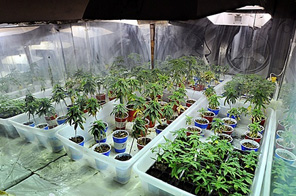California sprouts 'green rush' from marijuana
SAN FRANCISCO: A drug deal plays out, California-style: A conservatively dressed courier drives a company-leased Smart Car to an apartment on a weekday afternoon. Erick Alvaro hands over a white paper bag to his 58-year-old customer, who inspects the bag to ensure everything he ordered over the phone is there.
An eighth-ounce of organic marijuana buds for treating his seasonal allergies? Check. An eighth of a different pot strain for insomnia? Check. THC-infused lozenges and tea bags? Check and check, with a free herb-laced cookie thrown in as a thank-you gift.
It's a $102 credit card transaction carried out with the practiced efficiency of a home-delivered pizza — and with just about as much legal scrutiny.
More and more, having premium pot delivered to your door in California is not a crime. It is a legitimate business.
Marijuana has transformed California. Since the state became the first to legalize the drug for medicinal use, the weed the federal government puts in the same category as heroin and cocaine has become a major economic force.
No longer relegated to the underground, pot in California these days props up local economies, mints millionaires and feeds a thriving industry of startups designed to grow, market and distribute the drug.
Based on the quantity of marijuana authorities seized last year, the crop was worth an estimated $17 billion or more, dwarfing any other sector of the state's agricultural economy.
Experts say most of that marijuana is still sold as a recreational drug on the black market. But more recently the plant has put down deep financial roots in highly visible, taxpaying businesses:
Stores that sell high-tech marijuana growing equipment. Pot clubs that pay rent and hire workers. Marijuana themed magazines and food products. Chains of for-profit clinics with doctors who specialize in medical marijuana recommendations.
The plant's prominence does not come without costs, say some critics. Marijuana plantations in remote forests cause severe environmental damage. Indoor grow houses in some towns put rentals beyond the reach of students and young families. Rural counties with declining economies cannot attract new businesses because the available work force is caught up in the pot industry. Authorities link the drug to violent crime in otherwise quiet small towns.
"For those of us who are on the front lines, it's not about pot is bad in itself or drugs are bad," said Meredith Lintott, district attorney in Mendocino County, one of the country's top marijuana-producing regions.
"It's about the negative consequences on children. It's about the negative consequences on the environment."
Still, the sheer scale of the overall pot economy has some lawmakers pushing for broader legalization as a way to shore up the finances of a state that has teetered on the edge of bankruptcy. The state's top tax collector estimates that taxing pot like liquor could bring in more than $1.3 billion annually.
On Tuesday, Oakland will consider a measure to tax the city's four marijuana dispensaries, which the city auditor projects will ring up $17.5 million in sales in 2010. The city faces an $83 million budget shortfall, and expects the marijuana tax to raise $315,000.
Advocates point out that making pot legal would create millions if not billions of dollars more in indirect sales — the ingredients used to make edible pot products, advertising, tourism and smoking paraphernalia.
With a recent poll showing more than half of Californians supporting legalization, pot advocates believe they will prevail. And they say other states will follow.
Tim Blake is the proprietor of a 145-acre spiritual retreat center which holds an annual marijuana bud-growing contest in the heart of Northern California's pot-growing country.
Politicians, he says, are "going to see the economic benefits, they're going to see the health benefits and they're going to jump on the bandwagon."






